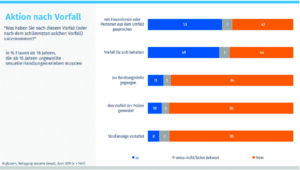by Nikolaus von Moos & Leah Mönkemöller
We are naked quite often in our lives. When we are born, shower, make love, go to the nudist beach or just change our underwear. Here, most of the time we are comfortable, in charge, and we have chosen this situation. Of course, there might be a bit of excitement and uncertainty when you have sex for the first time or with a new partner, but if it happens with consent, then most of the time in the above situations we are happy, feel well and might even have a buzz of good vibes around us.
Sometimes, however, it is different. Sometimes you don’t agree with being naked at all. Naked not necessarily only in the sense that most of your body can be seen without clothes, but naked also in the sense of psychological or social vulnerability.
In these situations, some people are in shock, unable to move, speak or do anything. Others get frightened, start to avoid people and social contacts. Everybody feels and acts differently, although no feeling or behaviour is wrong. As you, dear reader, might have guessed, we will talk about sexual harassment.
Definition of sexual harassment
According to the Swiss government, sexual harassment is a kind of violation of the personal integrity. Forms of sexual harassment are (not a complete list): 1) Presentation or spreading of pornographic material (also electronically). 2) Sexist jokes and salacious remarks. 3) Un- wanted touches and body contact. 4) Exertion of pressure in order to receive sexual services – often combined with the promise of advantages and the threatening of disadvantages.
To decide if an action is a flirt, a starting relationship or sexual harassment, there is a rule of thumb: what matters is how the behaviour is perceived by the affected person (as desirable or undesirable), not the intention of the person making advances.
Current situation in Switzerland
A study conducted in 2019 by the research institute gfs.bern in mandate for Amnesty International with 4495 women aged 16 and over living in Switzerland shows that 58% of women have already experienced sexual harassment in the form of touching, unwanted hugging or kissing. Most of the events happen on the street, on public transport as well as in bars or clubs.
The situation at ETH and other universities
According to the results of the #wiegETHs survey conducted by VSETH in the spring semester 2019 with bachelor’s and master’s students studying at ETH, 3% of participants have experienced “pushy behaviour, unwanted salacious remarks, inappropriate looks or promise of advantages in exchange to sexual service” in the ETH context. For cis-women, the number was 7%. Regarding physical sexual harassment, 2% of participants were affected. For cis-women the number mounted up to 4%.
Yet, the numbers differ drastically between the departments. The highest recorded percentage was 19% who experienced sexual harassment in general, of which 12% was physical. Another observation was a relationship between the percentage of cis-women in a department and the amount of reported sexual harassment. The fewer cis-women in a department, the more of them experienced harassment. A survey conducted at University of Bern showed similar results, suggesting that the events happen neither more nor less often at ETH than at other universities. Outside the universities, the numbers are often even higher. Independent of the reported percentage and whether sexual harassment is observed or experienced, every case is one too many.

De-escalating situations
But how to react when an interaction happens without consent? The most important thing to remember is that in all cases the aggressor is responsible for the sexual harassment and never the person experiencing the harassment. This means that following the advice below is not a guarantee for not experiencing a situation of sexual harassment, but it might help to de- escalate a critical situation.
- Communicate your borders that must not be crossed and state if you are not feeling well with a situation developing.
- At an event, try not to leave your drink unattended and if possible cover it while not drinking.
- Communicate to your friends or other people you trust if you are not feeling well (dizziness, problems with concentration, keeping awake) and find a safe spot together with them.
- Stay in contact with friends on the way home.
When something happened
As mentioned in the beginning, everyone reacts differently to sexual harassment. Take time to think about what you need, which people you want to be around and which counselling service you would feel comfortable with. Below is a list of possible things you can do after a sexual assault:
– In case of a physical assault, consult a doctor immediately in order to treat (internal) injuries and collect data.
– Together with help or if you feel emotionally ready, write down details of the harassment (who, where, when, what, under what circumstances). These will later help you to decide on further steps.
– If you want to file an official complaint, go to the police and report the assault. For this step to be prosecuted, it must be done within three months after the assault.
– Get professional support. There are several places which will help you in explaining your options after the incident and help with the psychological work-up: Hospital (usz.ch), Opferberatung Zürich (obzh.ch) or Die Dargebotene Hand (143.ch). If the incident happened at ETH, you can also contact the internal advice and conciliation service Respekt or an ombudsperson. Further important links and information on professional support you can find under help.vseth.ethz.ch.
– Speak about the incident with a person you trust.
– If you want to share a testimonial of the situation, you can report it to “Speak Up ETH” (bit.ly/speakupETH).
If you think that your own actions have crossed another’s person boundaries, or if you are unsure how an action was perceived by another person, you can still rectify the situation by 1) reflecting on your behaviour, 2) talking to the person in question and 3) seeking support. Go to respekt.ethz.ch for more information that might help you.
Communication is key
It must be our goal to communicate. On the one hand, intentions must be made clear and boundaries must be inquired by the other person, on the other hand, if you were affected by a sexual harassment, you can, if you feel like it, speak about it. There are people around that can and will help you and do not judge. Only together we have a chance to improve the current situation in Switzerland by bringing down the numbers and provide everybody with their freedom. Be this dressed or naked.
Nikolaus von Moos, 23, studies health science and technology in his 6th semester and wishes that people get on well with each other. That is why he supports discussions on topics where our society must improve.
Leah Mönkemöller, 22, studies interdisciplinary sciences in her 8th semester. Since September 2021, she has represented the interests of ETH students as Vice-President of VSETH and on the topic of university politics, including co-leading of a working group on topics of equal opportunities and respect.
